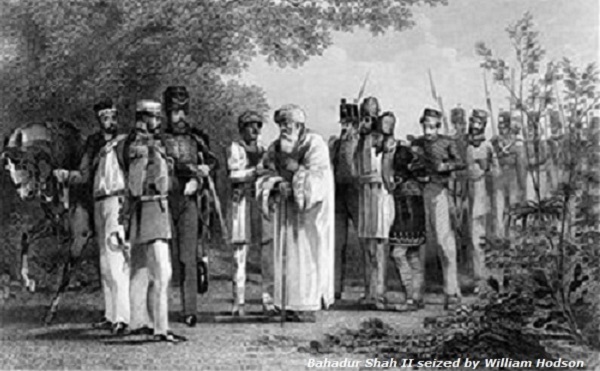Outcome of 1857 Revolt
The Revolt was suppressed. Sheer courage could not win against a powerful and determined enemy who planned its every step.
The rebels were dealt an early blow when the British captured Delhi on 20 September 1857 after prolonged and bitter fighting.
The aged Emperor Bahadur Shah was taken prisoner. The Royal Princes were captured and butchered on the spot. The Emperor was tried and exiled to Rangoon where he died in 1862.

John Lawrence, Outran, Havelock, Neil, Campbell, and Hugh Rose were some of the British commanders who earned military fame in the course of the revolt.
One by one, all the great leaders of the Revolt fell. Nana Sahib was defeated at Kanpur. Defiant to the very end and refusing to surrender, he escaped to Nepal early in 1859, never to be heard of again.
Tantia Tope escaped into the jungles of Central India where he carried on bitter and brilliant guerrilla warfare until April 1859 when he was betrayed by a zamindar friend and captured while asleep. He was put to death after a hurried trial on 15 April 1859.
The Rani Jhansi had died on the field of battle earlier on 17 June 1858.
By 1859, Kunwar Singh, Bakht Khan, Khan Bahadur Khan of Bareilly, Rao Sahib brother of Nana Sahib, and Maulavi Ahmadullah were all dead, while the Begum of Avadh was compelled to hide in Nepal.
By the end of 1859, British authority over India was fully reestablished, but the Revolt had not been in vain. It was the first great struggle of the Indian people for freedom from British imperialism. It paved the way for the rise of the modern national movement.
Weaknesses of Revolt
Indian sepoys and people were short of modern weapons and other materials of war. Most of them fought with such ancient weapons as pikes and swords.
Indian sepoys and other revolt participants were also poorly organized. There was communication gap and they lacked consensus.
The rebel units did not have a common plan of action, or authoritative heads, or centralized leadership.
The sepoys were brave and selfless but they were also ill-disciplined. Sometimes they behaved more like a riotous mob than a disciplined army.
The uprisings in different parts of the country were completely uncoordinated.
Once the Indian people overthrew British power from an area, they did not know what sort of power to create in its place.
They failed to evolve unity of action. They were suspicious and jealous of one another and often indulged in suicidal quarrels. For example, the Begum of Avadh quarreled with Maulavi Ahmadullah and the Mughal princes with the sepoy-generals.
The peasants destroyed revenue records and money-lenders' books, and overthrown the new zamindars, became passive not knowing what to do next.
Modern nationalism was yet unknown in India. Patriotism meant love of one's small locality or region or at most one's state.
In fact, the Revolt of 1857 played an important role in bringing the Indian people together and imparting to them the consciousness of belonging to one country.



